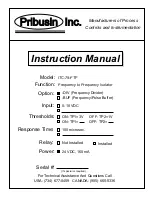
Dwg. 105133 Page 3
5. Output Type:
The ITC-79-FTF has three standard output types. These are Dry Contact, TTL (5V),
and 24 VDC. To activate the TTL output, jumper H4-4 must be inserted (factory
default setting). To activate the relay and 24 VDC output, jumper H4-1 must be
inserted. All outputs can be used simultaneously.
The 24 VDC output is a 'straight through' output which means that it follows the
incoming signal directly (i.e. when the input goes high the 24 VDC output goes high,
etc.). The TTL output is inverted ! (i.e. when the input goes high, the TTL output
goes low and vice versa).
6. Additional Setup & Calibration for ITC-79-FTF-BUF only:
The ITC-79-FTF-BUF stores incoming pulses (frequency) in an internal buffer in its
microprocessor and releases them at a slower rate as a 50% duty cycle square wave.
The output pulse release rate is adjustable from immediate output (no buffering) to
6.5 second pulse durations in 0.1 msec intervals. The pulse release rate is set up
using the jumper strip H1. The release time is encoded in binary which means that
up to 65536 (2
16
) combinations of release rates are selectable. Jumper position H1-
1 is equivalent to 0.1 msec, position H1-2 equals 0.2 msec, H1-3 equals 0.4 msec all
the way to H2-16 which equals 3276.8 msec (3.2768 sec.).
Example: for an output pulse rate of 1/2 second (500 msec.) the jumpers on H1 have
to be as follows.
H1-1
out
H1-5
out
H1-9
in
H1-13
in
H1-2
out
H1-6
out
H1-10
in
H1-14
out
H1-3
out
H1-7
out
H1-11
out
H1-15
out
H1-4
out
H1-8
in
H1-12
out
H1-16
out
The jumpers that are inserted carry the binary weights of 0.8+12.8+25.6+51.2+409.6
which when added together, results in 500.0 msec
Output Selection:
The ITC-79-FTF-BUF can be configured as a 'straight through' instrument or a pulse
buffer or a combination of both. Jumpers H4-1,2,3 control the relay output and
jumpers H4-4,5 control the TTL output. The following tables show how the different
jumpers affect the operation of the outputs:
Relay
TTL
Output
H4-1 Relay & 24 VDC follow input directly
H4-4 TTL Output follow
input directly
H4-2 Relay & 24 VDC driven by buffer
H4-5 TTL
Output
driven
by
buffer
H4-3 Relay & 24 VDC is same as TTL output
(depending
on
H4-4,5)





























